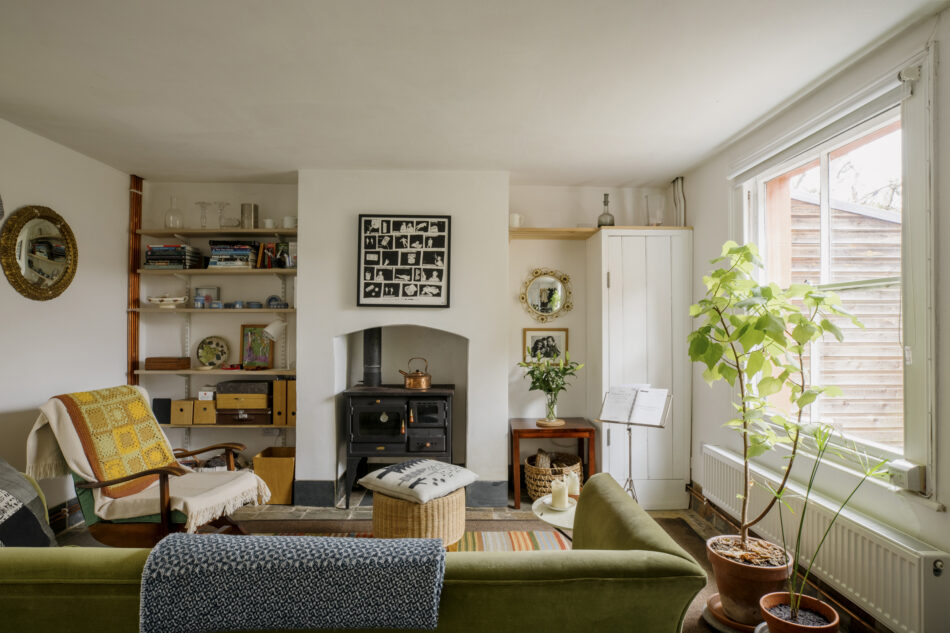
This charming Victorian house is set in an elevated position overlooking the beautiful valleys surrounding the popular town of Stroud. Semi-detached, the house is accessed via a paved footpath giving it a dreamy, secluded feeling despite its central location. Arranged over three storeys with three bedrooms, the house also has a wonderful airy kitchen extension at the rear that overlooks a large terraced garden with a separate cabin.
Setting the Scene
Set in the Cotswold area of outstanding natural beauty and named the best place to live in the UK in 2022 by The Sunday Times, Stroud is renowned for its community spirit, historic farmers’ market and easy connections to many outdoor beauty spots in the surrounding hills. Stroud has a vibrant town centre, and its valleys are laced with rows of attractive 19th-century terraced houses built to accommodate the bustling textile trade that elevated the sleepy town during the industrial revolution.
Constructed circa 1860, the house’s incised stucco façade peeks out among lilting branches of dwarf apple and blossoming cherry trees. Painted in a charming madder pink, the house sits above the Grade I-listed Church of All Saints, a late Gothic revival masterpiece. For more information, please see the History section.
The Grand Tour
The house is approached along a quiet path which borders the front garden, past a lovely terrace. Entry is under a small, gabled porch and through the panelled and half-glazed front door to a cosy sitting room. Here, light pours in through the original sash windows while slate tiles ground the space. A handsome wood burner has been installed into the original arched chimney breast.
An open-plan kitchen and dining room lies at the back of the plan. The extension was conceived by the current architect-owner and has been made almost entirely of glass, meaning the room is light and airy. Exposed beams run overhead, and stone tiles run underfoot. Painted in a striking chrome yellow, the modernism of the kitchen is the perfect complement to the house’s historic character. A large kitchen island has been cleverly designed to provide ample storage while creating a convivial place to prepare food while socialising. There is a wonderful walk-in pantry and a convenient utility room with a WC.
On the first floor, the main bedroom has wonderfully elevated views across the Stroud Valley and the church next door. Painted in neutral, creamy tones, the room is peaceful and serene. A pretty family bathroom has exceptional views through a lovely sash window. Two further bedrooms are found on the second floor, set into the eaves. Both are finished in the same pared-back palette as the main bedroom, allowing the materiality of the floorboards and panelling on the walls to shine.
A sweet cabin annexe is tucked at the back of the garden, nestled in the gently rising hillside. Fully insulated and with electricity, it would make a perfect office or guest suite. A porch running along the front of the cabin is the perfect spot for the views.
The Great Outdoors
At the front of the house are a terrace and a front garden planted with mature shrubs and trees. Hedges border the path, and a clematis rambles around a brick wall framing the view of the church spire. A large graduated garden runs behind the house, where stone steps lead to established herb beds. A decking area is a perfect place for alfresco dining in warmer months, and at the very top, an area has been laid out for vegetable and cut flower beds.
Out and About
The Gloucestershire town of Stroud stands at the meeting point of the Five Valleys and is surrounded by the Cotswold Area of Outstanding Natural Beauty in all directions. The house is located in a quiet residential, Uplands area of the town, within easy reach of its shops and cafés – Waitrose is within 10 mins walking distance. Stroud also has a national award-winning farmers market and numerous highly-regarded schools. The music scene is vibrant in this artistic town with venues across the town supporting a variety of performances year round.
The larger town of Cheltenham is 12 miles away, and the house is a 30-minute drive from junction 15 of the M4. The railway station, where direct trains run to London Paddington in approximately one and a half hours, is a 10-minute walk away.
Council Tax Band: B
History
With its earliest origins as an outlying area of Bisley, Stroud as a separate town began to emerge in the 13th century. It was originally recorded as “la Strode”, referring to the marshy territory where the River Frome and Slad Brook join.
Despite its watery terrain, the earliest houses of the town appear to have been built on the well-drained slope at the end of the ridge, on the edge of Slad Brook. The river Frome started to be known as Stroudwater, hence the name Stroud.
By the 16th century, Stroud was seeing rapid growth. The Cotswolds has always been well-known for its wool trade, and Stroud’s position next to a myriad of streams meant it was perfect for mills. As such, the town became a hub for the woollen cloth and clothing industry.
The town was described in 1714 as ‘the metropolitical town . . . for the clothing trade’ and in 1757 as ‘a sort of capital of the clothing villages’, its name now synonymous with high-quality richly-dyed broadcloth.
By the late 18th and early 19th century, roads improved, and the canals linked Stroud to the Severn and Thames, creating even more industry. By 1845 the railway had come to Stroud, and the town nearly doubled in size during this period, and brick houses replaced the traditional Cotswold stone.
Its position as the focus of an important industrial region was recognized in 1832 when it was made the centre of a parliamentary borough. The cloth industry had lost dominance in the parish by the end of the 19th century. Still, the adaptation of the mills to a variety of light industrial purposes maintained the growth of the population during the 20th century.
Interested? Let’s talk
Related Listings
- Go East: seven outstanding historic homes in rural East AngliaHomes / Interiors
- A Room of One’s Own: the whimsical garden sanctuary of Beata HeumanInteriors
- A Private View: a healing hideaway woven from yurts, cabins and countryside joyHomes / Interiors
- A Private View: the historic architecture connoisseur who reclaimed the poetry of Georgian living in HackneyHomes / Interiors
- A Private View: A playful Georgian home richly decorated with colour over caution in rural WiltshireHomes / Interiors

